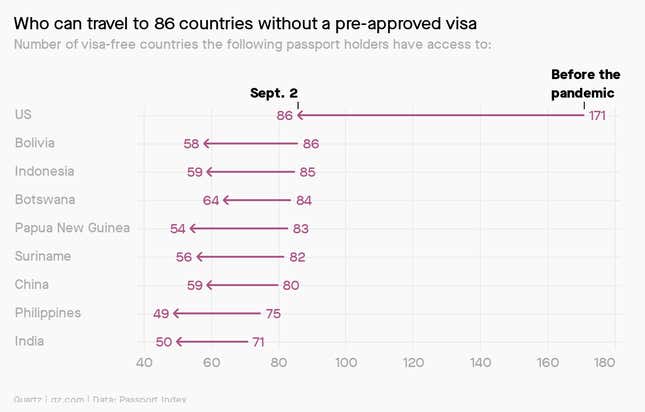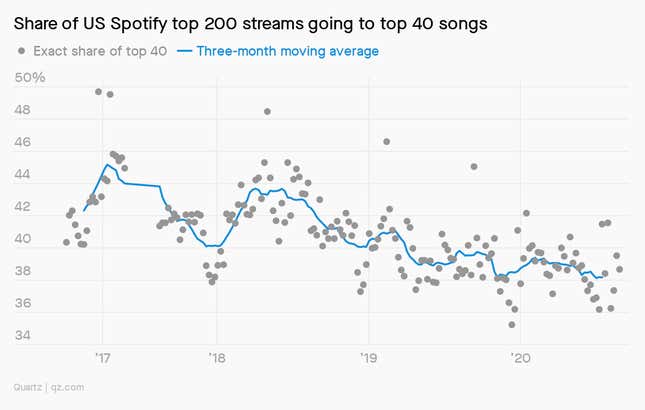Good morning, Quartz readers!
Here’s what you need to know
India has the second highest number of coronavirus cases. With more than 4.2 million cases, the country overtook Brazil (4.1 million) and now trails only the United States (6.2 million) in caseload. India is continuing with reopening plans to help restore the economy, even as its Covid-19 death toll approaches 72,000, the third highest worldwide.
China has a data request. Foreign minister Wang Yi is expected to announce an initiative calling on all countries to handle data security in an “evidence-based manner,” the Wall Street Journal reported. On Saturday, the Trump administration said it was considering export restrictions on China’s largest semiconductor manufacturer.
Hong Kong’s police are catching flack. More than 300 people were arrested in massive protests on Sunday, in recognition of the day Hong Kong had planned to hold elections. Among those detained was a 12-year-old girl whose mother said she was out buying art supplies.
Typhoon Haishen hit Japan and Korea. The storm shut down power in close to half a million homes and injured 52 as it swept through the western island of Kyushu in Japan, before moving onto the Korean peninsula, where at least two deaths have been reported.
The Philippine president pardoned a US marine who killed a transgender woman. Joseph Scott Pemberton, who murdered Jennifer Laude in 2014, was six years into his 10-year sentence when he was released by Rodrigo Duterte. The decision has been condemned as an attack on trans rights, and is widely seen as an effort to appease the US.
A punch in the passport
No one has been spared from Covid-19 travel restrictions: The number of countries that could be traveled to visa-free on any given passport fell 33% because of the pandemic. But US citizens took the biggest hit, according to the Passport Index. As of Sept. 2, a US passport holder could travel to 86 countries without a pre-approved visa, down from 171 last year.
Thirty-four of the countries that US citizens can’t travel to have banned tourists from any country, while the rest have opened to some foreigners but not US passport holders. That leaves Americans experiencing a common inconvenience for the majority of the world’s population: Prior to the pandemic, most people didn’t have visa-free access to as many countries as Americans do now.

🔮 Cleaning your crystal ball
As summer drew to a close, Elaine Rich and her team were poring over data on the pandemic, trying to determine how much the decision to close schools would help contain it. They were consulting epidemiologists and their own internal modeling, but the complexity of the question was still staggering. Just how important were schools to the virus’s spread?
The virus Rich and her team were studying was not Covid-19—in fact, it wasn’t real at all. It was a video game simulation conducted as part of a research project called FOCUS (Forecasting Counterfactuals in Uncontrolled Settings), sponsored by the research branch of the US intelligence community.
The story of the first round of FOCUS, told here for the first time, is about more than a fascinating attempt to study how humans reason using video games. Together, the project, the participants, and the researchers offer a primer on the science of forecasting and decision-making. Read more in this week’s field guide.
✦ Not a member? There’s an easy decision. You can access our full library of guides—and enjoy a paywall-free Quartz—by joining today.
Charting the fall of the top 40
Something is happening to the way Americans listen to music. The biggest hits are getting a little less popular.
On a typical Wednesday in early 2018, the top 40 songs on Spotify in the US would get around 35 million streams. In 2020, they rarely hit 30 million. A more detailed look at daily streams for the top 200 songs shows that the number of streams for songs 41-200 are almost exactly the same as in 2018, while the top 40 have fallen. As a result, the share of top-200 streams going to the top 40 songs fell from about 44% of streams to 39%.

One explanation might be Spotify’s recent focus on discovery: playlists with songs its algorithms think users will like. In March, the streaming giant updated its homepage to highlight those playlists, and in a recent quarterly report (pdf), Spotify said that the number of artists making up the top 10% of streams rose by over 40% between 2019 and 2020. In other words, it used to be that a smaller number of artists were concentrated at the top, but now it’s more diffuse.
Obsession interlude: Beyond Silicon Valley
“The world of innovation needs a refresh.”
That’s Alex Lazarow, a Bay Area-based venture capitalist, academic, and author. In his book Out-Innovate, Lazarow argues that this refresh is already underway, largely in emerging markets. There are 480 startup hubs worldwide, he points out, and 10% of unicorns are located outside Silicon Valley.
Lazarow has even given this shift a spirit animal. In the era of coronavirus-fueled uncertainty, he says startups should not strive to be like Silicon Valley unicorns, but instead like camels: capitalizing on opportunity while focusing on sustainability and long-term growth—i.e. surviving droughts and pandemics from the get-go.
You can fill up on our Beyond Silicon Valley obsession here. Or keep reading:
- VC firms are collaborating to keep Nigerian startups alive
- TikTok’s US suitors could end up with a shell company
- Who’s winning the battle for India’s $700 billion retail industry?
Surprising discoveries
Scientists think plants could help find missing bodies. A body left to decompose in the woods changes the soil and surrounding trees, which might provide clues.
Hosting the Olympics is as financially risky as war. Oxford researchers found that the Olympic Games, on average, run 172% over budget.
Japanese gangsters are recruiting septuagenarians. More than 10% of the country’s gang members are in their 70s, as harsher punishments turn younger generations away from crime.
These companies help people disappear. Whether escaping an abusive relationship, running from family obligations, or simply starting over, “night moving” can be crucial.
Elephants like Frank Sinatra. An unhappy elephant on a long journey to better conditions has responded well to singing from his rescuers, especially Sinatra’s “My Way.”
Our best wishes for a productive day. Please send any news, comments, spare passports, and elephant playlists to hi@qz.com. Get the most out of Quartz by downloading our app on iOS and becoming a member. Today’s Daily Brief was brought to you by Youyou Zhou, Walter Frick, Dan Kopf, Olivia Goldhill, and Kira Bindrim.